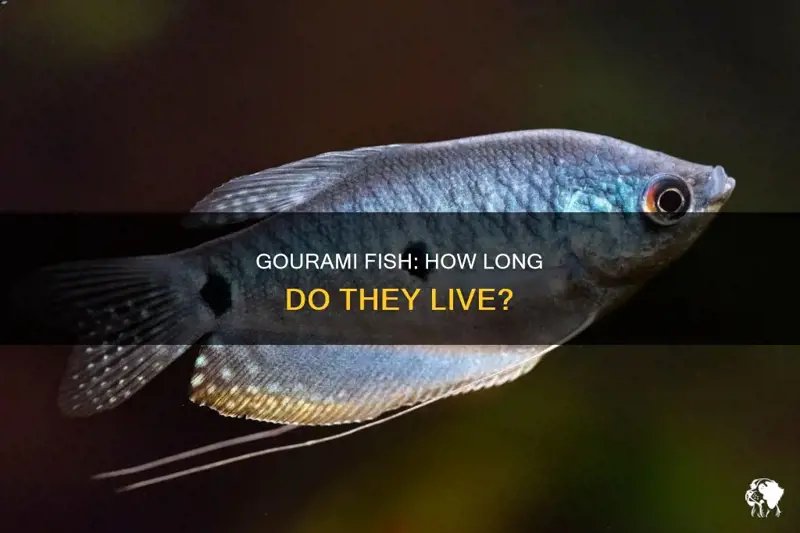
Gouramis are freshwater fish, belonging to the family Osphronemidae. With their vibrant colors and unique personalities, they make great pets. But just like any living being, they have their own life cycles and needs. In this article, we’ll dive into how long gourami live in captivity and what factors can influence their lifespan. Whether you’re new to fishkeeping or just curious, let’s explore the fascinating world of gourami!
Understanding Gourami Lifespan
The average lifespan of a gourami in captivity can range from 4 to 8 years, depending on the species. Some might even live longer with exceptional care! For instance, the popular dwarf gourami typically lives around 4 to 5 years, while the larger blue gourami can reach 6 to 8 years. The difference in lifespan often comes down to several factors, including the species, living conditions, and diet.
It’s like caring for a houseplant: some plants need more attention and specific conditions to thrive, while others can be quite forgiving. Gouramis, in particular, require specific water conditions and a balanced diet to reach their full lifespan potential.
Factors Affecting Gourami Lifespan
Many factors influence how long gouramis live. Here are some key elements that can play a significant role:
- Water Quality: Clean and well-maintained water is crucial for their health. Regular water changes help prevent diseases.
- Diet: A well-balanced diet filled with high-quality flakes, pellets, and occasional treats like brine shrimp can greatly enhance their longevity.
- Tank Size: Providing enough space allows them to thrive. Overcrowded tanks lead to stress and illness.
- Companionship: While gouramis can be social, not all tank mates are suitable. The right companionship can prevent stress and aggression.
Paying attention to these factors is like setting the perfect stage for a play—everything needs to be just right for the best performance!
Common Gourami Species and Their Lifespans
When it comes to gouramis, there are several different species, each with its unique charm and lifespan.
– Dwarf Gourami: This species is popular for its small size and vibrant colors. They usually live 4 to 5 years.
– Blue Gourami: Known for their calm nature, these fish typically enjoy a longer life, averaging 6 to 8 years.
– Gold Gourami: Another beautiful option, the gold gourami, can live around 5 to 7 years in a well-maintained tank.
By choosing the right species for your aquarium, you can find one that fits your tank setup while also ensuring a longer lifespan. It’s important to research and understand the specific needs of each species.
The Role of Genetics in Lifespan
You might be surprised to learn that genetics also play a significant role in how long your gourami lives. Just like humans, some fish are naturally more resilient than others. When purchasing your fish, it’s beneficial to buy from reputable breeders or stores that prioritize the health of their stock.
Healthy fish tend to have a better chance of reaching their full lifespan. Look for gouramis that are active, have bright colors, and show no signs of stress. If you find a healthy fish, it’s like winning the jackpot in a lottery!
Optimal Care for Longer Lifespan
To maximize your gourami’s life expectancy, here are some tips for providing top-notch care:
1. Maintain Water Quality: Regular water testing for pH, ammonia, nitrites, and nitrates is essential. Ensure your water parameters are suitable for your specific gourami species.
2. Feed a Balanced Diet: Offer both high-quality dry food and occasional live or frozen food to keep your fish well-nourished and happy.
3. Create a Comfortable Environment: Include plants, hiding spots, and gentle filtration to replicate their natural habitat. This not only helps reduce stress but also provides a stimulating environment.
4. Monitor for Diseases: Be vigilant about any changes in behavior or appearance. Early detection of illness is crucial for treatment.
Taking these steps is like building a solid foundation for your home; a good start leads to a long-lasting life.
Signs of Aging in Gourami
As your gourami ages, you might notice some changes, just like you observe in older pets. Here are some signs that your gourami is getting older:
– Decreased Activity: Like a senior becoming less energetic, older gouramis may swim less often.
– Color Fading: Vibrancy can diminish with age, so if you notice a duller hue in your fish, it may be a sign of aging.
– Changes in Eating Habits: An older gourami might eat less or be more selective about food.
Recognizing these changes could help you provide the best care for your aging fish. It’s a gentle reminder that all life has its seasons.
Preparing for Your Gourami’s End of Life
Facing the inevitable end of a pet’s life is never easy. With gouramis, it’s important to be prepared. Here are a few tips:
– Know When to Seek Help: If your fish shows signs of distress or illness that don’t improve with care, consult a vet who specializes in fish.
– Consider Tank Mates: If your gourami passes away, monitor the condition of the remaining fish, as they may be affected emotionally or health-wise.
– Reflect on the Experience: Remember the joy your gourami brought into your life, and consider getting another fish if you’re ready, but ensure you set up a nurturing environment first.
It’s a bittersweet part of pet ownership, but knowing what to expect can help ease the transition.
So, how long do gourami live? The answer can vary, but with proper care, they can be vibrant and delightful companions for many years. Providing a suitable environment, a balanced diet, and monitoring their health can significantly extend their lifespan.
In the end, your gourami’s life is not just about the number of years but the quality of those years. By being a diligent and caring fishkeeper, you can ensure your gourami has a happy, healthy life, bringing joy and tranquility to your home aquarium. Enjoy the journey with your aquatic friend!

